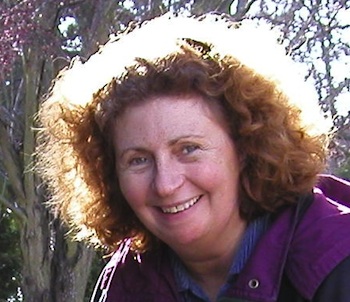
Psychotherapist, Zen practitioner, and author, Nancy Welch.

Practicing with the Body:
Conversations on Medicine & Meditation
“I wanted to write this book to give others hope that despite chronic illness and pain, there are options to how one learns to accept suffering,” writes Nancy Welch, psychotherapist and Zen practitioner. “It is my hope that the voices here will lead others, too, to the profound, loving, and most of all, joyful acceptance of life on its own terms.”
The twelve voices in Welch’s compilation, Medicine & Meditation, belong to dharma practitioners who experience chronic, debilitating illness as well as those who interact with them: caregivers, physicians, psychologists and teachers. Many of them live, practice, or teach in the Northwest.
Included in the collection are interviews with Norman Zoketsu Fischer on working with the chronically ill; Ruth Ozeki on caring for her mother with Alzheimer’s; and Marsha Linehan, PhD, on the Buddhist foundation of Dialectical Behavioral Therapy.
Welch is a psychotherapist and Zen student who lives in Bellingham, Washington where she is active in the Red Cedar Zen Community. She has received Lay Entrustment to teach meditation from her primary teacher, Zoketsu Norman Fischer. Since the age of seven, when she developed juvenile rheumatoid arthritis, she has had intimate knowledge of both the physical and psychological aspects of chronic illness and pain.
“Therapy and medications were helpful,” she recalls, “but it was not until I began exploring the practice of Zen that I was able to put my ‘suffering’ into a completely different perspective. Through the quiet of just sitting, attending to my breathing... I found I could have moments of peace in my mind. Reading some of the teachings of Zen, I learned that I was creating much of my own inner turmoil by piling suffering upon suffering in the form of the hate and shame and condemnation I felt toward my disease.”
In the conversations recorded in Medicine & Meditation, the skillful examination of “pain” and “suffering” is a recurring theme. “I don’t know that suffering is optional,” offers Dr. David Zucker, medical director of Cancer Rehabilitation Services at Swedish Cancer Institute in Seattle. A student of meditation for many years, including formal Buddhist monastic training, Zucker uses meditation in his work with cancer patients. “What I believe is that by learning to turn toward suffering with skill and kindness, well-being is possible.”
Florence Caplow, a Bellingham-based botanist and ordained Zen priest who also practices Vipassana meditation, has had a challenging auto-immune disorder for the last ten years. “There are different levels of suffering,” she says. “The fact is physical suffering can be incredibly intense… Then there is our learned response to pain, how we interpret the sensations we are experiencing… If we judge the experiences to be intolerable, we will experience them as intolerable.” At a month-long Vipassana retreat Caplow found that she “...could either experience the pain as pain that she really desperately wanted to stop… or I could just note it as an unpleasant physical sensation.” She became aware that there were many sensations happening all at once, some “pleasant, even wonderful” and others “unpleasant, even terrible”. But, she realized, “I could choose what to attend to, and remember that all of it was impermanent, even the pain.”
A number of contributors are quick to point out that though meditation can be extremely helpful, it is not a panacea or permanent solution for illness, fatigue, or pain. Sandy Taylor, founder and former teacher of the Seattle Soto Zen sangha, explains, “Let’s say you have an injury and you are sitting meditating and it hurts like fury. You acknowledge it: ‘It hurts. It hurts.’ Meditation is not a cure. It is a form of coming to grips with your body.”
Tim Burnett, Zen priest and head of Bellingham’s Red Cedar Zen Community, is the companion and, as needed, caregiver for his wife, Janet Martinson, who for several years has experienced a form of chronic fatigue syndrome. “Meditation is not a quick fix to any emotional or physical problems,” he says. “My sense is that since I have practiced meditation all these years, it is much more possible for me to be patient and especially humble through this process. I believe patience and humility are two of the most important qualities for a caretaker.”
Patience and acceptance are common themes in these interviews. Having or caring for someone with a chronic-relapsing type of illness teaches the importance of accepting whatever conditions prevail in any given moment. Several contributors recall struggling in the early days of illness with the hope or expectation that each “improvement” signaled a permanent abatement of the condition, followed by disappointment when symptoms returned. What they learn is to recognize and respect what is possible and even joyful “in this very moment”.
Confronting what could be called the “limitations” of physical discomfort, fatigue, and other cognitive conditions brings to light attachments to what are revealed to be inessentials, such as the “right” zazen posture, a daily sitting schedule, a certain duration of meditation. Adaptability becomes a practice of compassion.
What one learns from Medicine & Meditation is not merely that sickness, old age, and the pain of approaching death are teachers, but rather the extent to which they are such very good teachers. In the words of David Zucker:
“What Buddhism teaches is inherent in the illness experience without having to be named… The full potential of what it is to be human is right there in the center of illness. It is a matter of focusing in a way that inclines the heart toward wisdom and well-being. It is a way of life.“
For more information about Nancy Welch and Medicine & Meditation, please visit: www.medicinemeditation.com.
Contributor: Julie (no relation!) Welch.
Photo: Janet Martinson.